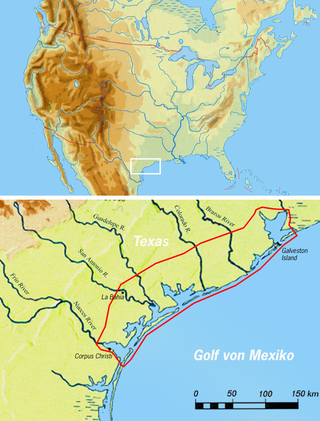Related Research Articles

The Kickapoo people are an Algonquian-speaking Native American and Indigenous Mexican tribe, originating in the region south of the Great Lakes. Today, three federally recognized Kickapoo tribes are in the United States: the Kickapoo Tribe in Kansas, the Kickapoo Tribe of Oklahoma, and the Kickapoo Traditional Tribe of Texas. The Oklahoma and Texas bands are politically associated with each other. The Kickapoo in Kansas came from a relocation from southern Missouri in 1832 as a land exchange from their reserve there. Around 3,000 people are enrolled tribal members.

Indian Territory and the Indian Territories are terms that generally described an evolving land area set aside by the United States government for the relocation of Native Americans who held original Indian title to their land as an independent nation-state. The concept of an Indian territory was an outcome of the U.S. federal government's 18th- and 19th-century policy of Indian removal. After the American Civil War (1861–1865), the policy of the U.S. government was one of assimilation.

The American Indian Wars, also known as the American Frontier Wars, and the Indian Wars, was a conflict initially fought by European colonial empires, United States of America, and briefly the Confederate States of America and Republic of Texas against various American Indian tribes in North America. These conflicts occurred from the time of the earliest colonial settlements in the 17th century until the end of the 19th century. The various wars resulted from a wide variety of factors, the most common being the desire of settlers and governments for Indian tribes' lands. The European powers and their colonies enlisted allied Indian tribes to help them conduct warfare against each other's colonial settlements. After the American Revolution, many conflicts were local to specific states or regions and frequently involved disputes over land use; some entailed cycles of violent reprisal.
Lipan Apache are a band of Apache, a Southern Athabaskan Indigenous people, who have lived in the Southwest and Southern Plains for centuries. At the time of European and African contact, they lived in New Mexico, Colorado, Oklahoma, Texas, and northern Mexico. Historically, they were the easternmost band of Apache.

An American Indian reservation is an area of land held and governed by a U.S. federal government-recognized Native American tribal nation, whose government is autonomous, subject to regulations passed by the United States Congress and administered by the United States Bureau of Indian Affairs, and not to the U.S. state government in which it is located. Some of the country's 574 federally recognized tribes govern more than one of the 326 Indian reservations in the United States, while some share reservations, and others have no reservation at all. Historical piecemeal land allocations under the Dawes Act facilitated sales to non–Native Americans, resulting in some reservations becoming severely fragmented, with pieces of tribal and privately held land being treated as separate enclaves. This jumble of private and public real estate creates significant administrative, political, and legal difficulties.

The Karankawa were an Indigenous people concentrated in southern Texas along the coast of the Gulf of Mexico, largely in the lower Colorado River and Brazos River valleys. They consisted of several independent, seasonal nomadic groups who shared a language and some culture.

The Wichita people, or Kitikiti'sh, are a confederation of Southern Plains Native American tribes. Historically they spoke the Wichita language and Kichai language, both Caddoan languages. They are indigenous to Oklahoma, Texas, and Kansas.

McMurry University is a private Methodist university in Abilene, Texas, United States. It was founded in 1923 and named after William Fletcher McMurry. The university offers forty-five majors in the fields of fine arts, humanities, social and natural sciences, education, business, and religion, and nine pre-professional programs, including nursing, dentistry, medicine, pharmacy, veterinary, and law.

The Tonkawa are a Native American tribe who now live in Oklahoma. Their Tonkawa language, now extinct, is a linguistic isolate.
State-recognized tribes in the United States are organizations that identify as Native American tribes or heritage groups that do not meet the criteria for federally recognized Indian tribes but have been recognized by a process established under assorted state government laws for varying purposes or by governor's executive orders. State recognition does not dictate whether or not they are recognized as Native American tribes by continually existing tribal nations.

The Black Seminoles, or Afro-Seminoles, are an ethnic group of mixed Native American and African origin associated with the Seminole people in Florida and Oklahoma. They are mostly blood descendants of the Seminole people, free Africans, and escaped former slaves, who allied with Seminole groups in Spanish Florida. Many have Seminole lineage, but due to the stigma of having mixed origin, they have all been categorized as slaves or freedmen in the past.

Ysleta del Sur Pueblo, also Tigua Pueblo, is a Native American Pueblo and federally recognized tribe in the Ysleta section of El Paso, Texas. Its members are Southern Tiwa people who had been displaced from Spanish New Mexico from 1680 to 1681 during the Pueblo Revolt against the Spaniards.
Patrick Stephen Hape is a former American football fullback and tight end for the Denver Broncos, Tampa Bay Buccaneers, and Houston Texans of the National Football League (NFL). He was selected in the fifth round of the 1997 NFL draft.

The history of Oklahoma refers to the history of the state of Oklahoma and the land that the state now occupies. Areas of Oklahoma east of its panhandle were acquired in the Louisiana Purchase of 1803, while the Panhandle was not acquired until the U.S. land acquisitions following the Mexican–American War (1846–1848).

The Oglala are one of the seven subtribes of the Lakota people who, along with the Dakota, make up the Očhéthi Šakówiŋ. A majority of the Oglala live on the Pine Ridge Indian Reservation in South Dakota, the eighth-largest Native American reservation in the United States.
The Kadohadacho are a Native American tribe within the Caddo Confederacy. Today they are enrolled in the Caddo Nation of Oklahoma.

The Alabama–Coushatta Tribe of Texas is a federally recognized tribe of Alabama and Koasati in Polk County, Texas, United States. These peoples are descended from members of the historic Muscogee or Creek Confederacy of numerous tribes in the Southeastern U.S., particularly Georgia and Alabama.

The Coahuiltecan were various small, autonomous bands of Native Americans who inhabited the Rio Grande valley in what is now northeastern Mexico and southern Texas. The various Coahuiltecan groups were hunter gatherers. First encountered by Europeans in the 16th century, their population declined due to European diseases, slavery, and numerous small-scale wars fought against the Spanish, criollo, Apache, and other Indigenous groups.

Native American tribes in Texas are the Native American tribes who are currently based in Texas and the Indigenous peoples of the Americas who historically lived in Texas.
References
- 1 2 3 4 Campbell, Thomas N. "Hape Indians". Texas State Historical Association. Retrieved 11 August 2024.
- 1 2 3 "Amistad NRA: American Indian Tribal Affiliation Study (Phase 1) (Chapter 2)". npshistory.com. Retrieved 11 August 2024.
- ↑ Biles, Stephen P. (8 July 2014). Encyclopedia of Early Texas History: A Compendium of Texas Antiquity for the Inquisitive Mind. Arcadia Publishing. ISBN 978-1-62584-986-1.